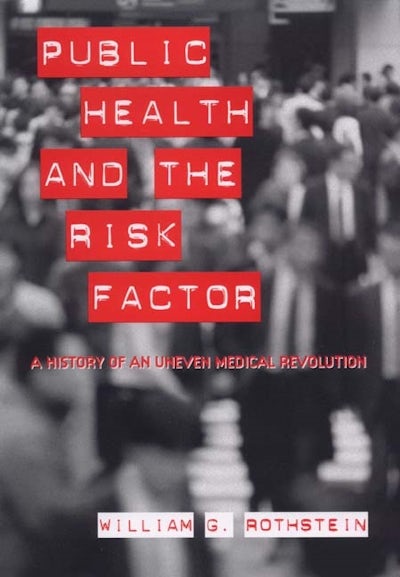
Title Details
480 Pages
22.8 x 15.2 cm
Series: Rochester Studies in Medical History
Series Vol. Number:
3
Imprint: University of Rochester Press
Public Health and the Risk Factor
A History of an Uneven Medical Revolution
- Description
- Contents
- Reviews
A look at how the concept of "risk factor" has influenced public health and preventive medicine, with an emphasis upon the study of heart disease.
The greatest revolutions in twentieth-century public health and preventive medicine have been the concepts of risk factors and healthy lifestyles as methods of preventing disease. A risk factor is anything that increases the riskof disease in an individual. Lifestyle refers to the individual's personal behaviors with regard to risk factors. Identifying risk factors and modifying them by changing lifestyles in order to prevent disease has become ubiquitousas a strategy in public health.
The book examines the history and evolution of the concepts of risk factors and healthy lifestyles and their application to coronary heart disease, the major chronic disease of the twentieth century. The first part contains a history of the use of statistics in public health and medicine, and the ways in which various industries developed the concept of the risk factor. The second part describes the concept of healthylifestyles, which was devised by municipal public health departments and life insurance companies in the early part of the century. The third and fourth parts examine how the concepts of risk factors and lifestyles were applied tothe primary chronic disease of the twentieth century -- coronary heart disease. The focus of the book overall is on coronary heart disease as a public health, rather than a medical, issue, and the various concepts that have beenused in preventing it.
William G. Rothstein is Professor of Sociology at the University of Maryland, Baltimore County.
The greatest revolutions in twentieth-century public health and preventive medicine have been the concepts of risk factors and healthy lifestyles as methods of preventing disease. A risk factor is anything that increases the riskof disease in an individual. Lifestyle refers to the individual's personal behaviors with regard to risk factors. Identifying risk factors and modifying them by changing lifestyles in order to prevent disease has become ubiquitousas a strategy in public health.
The book examines the history and evolution of the concepts of risk factors and healthy lifestyles and their application to coronary heart disease, the major chronic disease of the twentieth century. The first part contains a history of the use of statistics in public health and medicine, and the ways in which various industries developed the concept of the risk factor. The second part describes the concept of healthylifestyles, which was devised by municipal public health departments and life insurance companies in the early part of the century. The third and fourth parts examine how the concepts of risk factors and lifestyles were applied tothe primary chronic disease of the twentieth century -- coronary heart disease. The focus of the book overall is on coronary heart disease as a public health, rather than a medical, issue, and the various concepts that have beenused in preventing it.
William G. Rothstein is Professor of Sociology at the University of Maryland, Baltimore County.
The Origins of Probability and Statistics
Censuses and Vital Statistics
Statistical Analyses of Medical and Social Data
Life Insurance and the Risk Factor
Cultural And Environmental Influences on Urban Mortality Rates
The Germ Theory and Health Education in Diptheria and Tuberculosis Control
Health Education and Infant Mortality in New York City
The Metropolitan Life Insurance Company Health Education Programs
Early Twentieth-Century Mortality Trends and Rheumatic Heart Disease
The Early Years of the Coronary Heart Disease Epidemic
Causes, Correlations, and the Etiology of Disease
Cigarette Smoking and Statistical Correlations
Blood Pressure and the Benefits of Treatment
The Framingham Heart Study and the Risk Factor
Theories of the Causes of Coronary Heart Disease
The Diet-Heart Hypothesis
Dietary Recommendations and Guidelines
The Secular Decline in the Coronary Heart Disease Epidemic
Censuses and Vital Statistics
Statistical Analyses of Medical and Social Data
Life Insurance and the Risk Factor
Cultural And Environmental Influences on Urban Mortality Rates
The Germ Theory and Health Education in Diptheria and Tuberculosis Control
Health Education and Infant Mortality in New York City
The Metropolitan Life Insurance Company Health Education Programs
Early Twentieth-Century Mortality Trends and Rheumatic Heart Disease
The Early Years of the Coronary Heart Disease Epidemic
Causes, Correlations, and the Etiology of Disease
Cigarette Smoking and Statistical Correlations
Blood Pressure and the Benefits of Treatment
The Framingham Heart Study and the Risk Factor
Theories of the Causes of Coronary Heart Disease
The Diet-Heart Hypothesis
Dietary Recommendations and Guidelines
The Secular Decline in the Coronary Heart Disease Epidemic
"Rothstein portrays the dynamics of how industry, medical science, the media and popular culture have all pitched in to shape contemporary notions of a risk factor. . . . With this book, [he] adeptly . . . shows how -- void of an understanding of the influence that social, political, and economic values have on our notions of risk -- it becomes exceedingly difficult to parse out the differences between scientific evidence and the conclusions drawn from that evidence." Ashley Naimi, AMERICAN JOURNAL OF EPIDEMIOLOGY, January 2009
"Public Health and the Risk Factor is a terrific book. It describes the evolution of a concept that has become central to public health and medical thought: the risk factor. The author uses nontechnical language to guide readers through a wide array of 18th-, 19th-, and 20th-century technical developments that are the basis of our current understanding of the risk factor concept." JOURNAL OF THE AMERICAN MEDICAL ASSOCIATION Volume 290, No 17
"[The New England Journal of Medicine] strongly recommend[s] this book to everyone interested in the interface of public health and clinical medicine and in the epidemiology of CHD." NEW ENGLAND JOURNAL OF MEDICINE, February 2004
"[A] well written book...whether you read the entire book, or only selected chapters, you will walk away with a wealth of knowledge." NEW JERSEY MEDICINE
"A rich and useful study." JOURNAL OF THE HISTORY OF MEDICINE
"This . . . is a sophisticated analysis of the way health policy was and is created, amended, and circumvented. While maintaining good sociological skepticism about motives, it is open-minded about the role of industry and technology in helping to advance a healthier society. . . . The individual and collective power of Rothstein's facts and linkages is overwhelming and, at the same time, delightful. . . . He has written one of the best books in the sociology of medicine in recent memory." CONTEMPORARY SOCIOLOGY
"In clear, nontechnical language Rothstein introduces readers to the history of vital statistics and their precursors, from sixteenth-century bills of mortality to censuses and on to the increasingly complex life tables of the insurance industry." PROJECT MUSE
Paperback
9781580462860
April 2008
£40.00 / $49.95
Ebook (EPDF)
9781580466141
May 2003
£24.99 / $29.95
Title Details
480 Pages
2.28 x 1.52 cm
Series: Rochester Studies in Medical History
Series Vol. Number:
3
Imprint: University of Rochester Press












